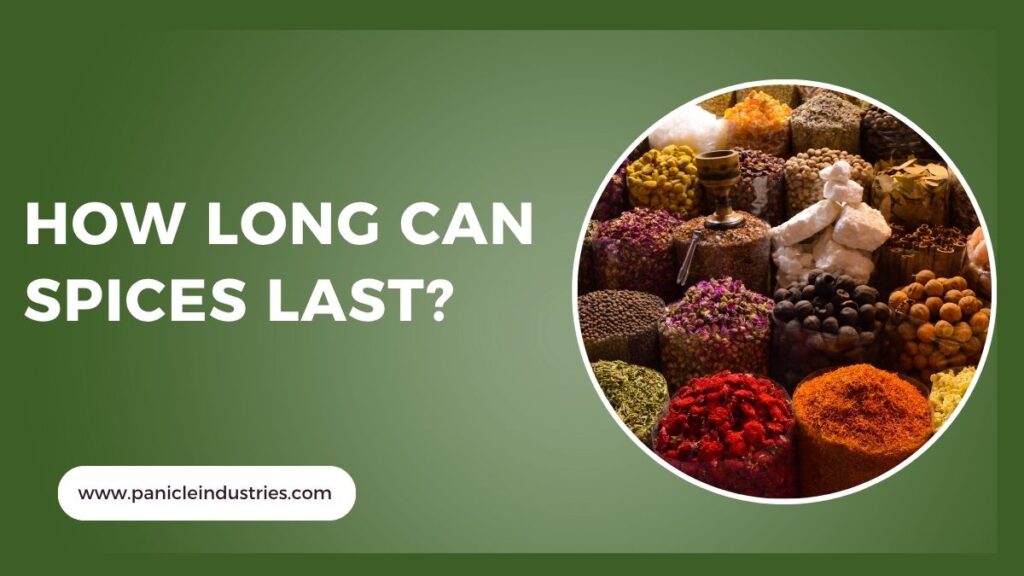Spices are an essential part of every kitchen. They add flavor, aroma, and color to our food and turn simple dishes into something special. But just like other food items, spices do not last forever. Many people often ask, “How long can spices last?” This is an important question, especially if you want to get the best taste and health benefits from your spices. While spices may not spoil like milk or vegetables, they do lose their strength, smell, and quality over time.
In this blog, we will discuss how long different types of spices last, how to store them properly, and how to tell if your spices have gone bad. Let’s explore everything you need to know about spice shelf life.
What Are Spices?
Spices come from dried parts of plants such as seeds, bark, roots, fruits, and flowers. They are used to flavor and preserve food and have also been used for their medicinal properties for thousands of years.
Common Types of Spices:
- Whole Spices: Black pepper, cumin seeds, cardamom, cloves
- Ground Spices: Turmeric powder, chili powder, cinnamon powder
- Herbs (often confused with spices): Basil, oregano, thyme (usually fresh or dried leaves)
Each type has its own shelf life and needs proper storage to stay fresh.
Also read: What Is the Health Benefits of Cinnamon Powder?
How Long Can Spices Last?
The answer depends on whether the spice is whole or ground and how it is stored. In general:
| Spice Type | Average Shelf Life |
|---|---|
| Whole Spices | 3 to 4 years |
| Ground Spices | 1 to 2 years |
| Dried Herbs | 1 to 3 years |
Let’s break this down further.
1. Whole Spices – Last Longer
Whole spices retain their flavor and aroma much longer than ground spices because they have less surface area exposed to air and moisture.
Examples:
- Black peppercorns
- Cumin seeds
- Cloves
- Cardamom pods
- Coriander seeds
Shelf Life: Up to 4 years when stored in airtight containers away from light and heat.
Tip: Grind whole spices just before using to get the best taste.
2. Ground Spices – Shorter Shelf Life
Ground spices lose their flavor more quickly. Once a spice is ground, it starts to break down and loses its essential oils.
Examples:
- Ground turmeric
- Ground cinnamon
- Chili powder
- Cumin powder
- Garam masala
Shelf Life: 1 to 2 years
Tip: Buy ground spices in small quantities and refill when needed.
3. Dried Herbs – Delicate and Light
Herbs like parsley, oregano, mint, and basil have a more delicate flavor and aroma. They can lose their strength faster than spices.
Shelf Life: 1 to 3 years depending on the herb and storage conditions
Tip: Crush dried herbs in your hand before using to release aroma.
Signs That Spices Have Gone Bad
Spices do not grow mold or bacteria easily, but they do lose their effectiveness over time. Here are some clear signs that it’s time to throw them away:
1. Faded Color
Fresh spices usually have a strong, rich color. If your spice looks pale or dull, it’s likely lost its strength.
2. Weak Aroma
If you can’t smell much when you open the jar, the spice has likely gone stale.
3. Flat Taste
Old spices don’t add the same flavor to your food. If your dish tastes bland even after adding spices, it’s time for a replacement.
4. Lumps or Moisture
If a spice is clumped or sticky, it might have absorbed moisture and should be discarded.
Best Practices to Store Spices
To make your spices last as long as possible, follow these simple storage tips:
1. Keep Away from Heat
Store spices in a cool, dry place. Avoid keeping them near the stove, oven, or direct sunlight.
2. Use Airtight Containers
Moisture and air can spoil spices quickly. Always store them in airtight jars or containers.
3. Avoid Using Wet Spoons
Never use a wet spoon in your spice jar. This adds moisture and encourages clumping or spoilage.
4. Label and Date
When you buy or refill a spice, write the purchase date on the jar. This helps you track its freshness.
Should You Refrigerate Spices?
For most spices, refrigeration is not necessary. However, for certain spices with higher oil content like paprika or chili powder, refrigeration may help prevent rancidity in very hot climates.
Tip: If you store spices in the fridge, keep them in tightly sealed containers to prevent them from absorbing odors.
How to Test Spice Freshness at Home
Here’s a simple test to check if a spice is still good:
- Smell Test: Open the jar and take a sniff. If it smells strong and fresh, it’s good.
- Taste Test: Place a small amount on your tongue. If the flavor is sharp and recognizable, it’s still fresh.
- Color Test: Check for vibrant color. Faded color may mean weaker flavor.
Tips for Buying Spices
To ensure long-lasting spices, buy them smartly.
1. Buy Small Quantities
It’s better to buy small jars and refill when needed than to keep a large container that loses freshness.
2. Buy Whole When Possible
Whole spices stay fresh longer. If you have a spice grinder at home, consider buying whole and grinding as needed.
3. Check Packaging Dates
Look for “packaged on” or “best before” dates. Fresher spices give better flavor.
Can Expired Spices Be Harmful?
In most cases, expired spices are not harmful, but they will not add much flavor or aroma to your food. However, if a spice smells rancid, has mold, or changes color drastically, throw it away.
Note: Always inspect old spices before use, especially if they have been exposed to moisture.
How Long Can Spices Last in Bulk?
Buying spices in bulk can save money, but it comes with a risk of losing freshness faster if not stored properly.
Tips for Bulk Storage:
- Divide large quantities into smaller airtight containers.
- Store unused portions in dark, cool places.
- Avoid opening the full bulk bag frequently.
When stored well, bulk spices can last as long as individually packed spices, but freshness depends on exposure to air and light.
Conclusion
Understanding how long can spices last is key to keeping your kitchen ingredients fresh and your meals flavorful. While spices do not spoil like perishable foods, they lose their aroma, color, and taste over time. Whole spices last longer than ground ones, and proper storage can extend their shelf life. Keep spices in airtight containers, away from heat and light, and avoid using wet spoons. Always check for faded color or a weak smell to know if your spices are still fresh.
By managing your spices wisely, you can enjoy better tasting food and avoid waste. Make it a habit to refresh your spice rack regularly for the best cooking experience.


